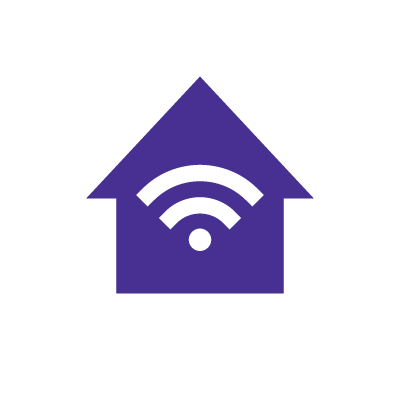Mesh WiFi Router vs Traditional Router: Which is the Best for You?

Choosing the right router for your home network ensures you’ll have a reliable, strong internet connection across all your devices. It’s an important decision, but it’s not always easy with so many types of routers available on the market.
Some of the most popular routers include traditional routers and mesh routers. Some users even opt for gaming routers, in order to prioritize gaming across their home network. Both traditional routers and mesh routers cater to different needs. In this article we will focus on the differences between these two types of routers, who they are best suited for and their key features and benefits.
After reading this article, you should be able to make an informed decision on which router is best for you and learn about how routers can provide different internet speeds for your home.
WiFi that just works!
WiFi plans for any home
Tiny, large or somewhere in between; find WiFi coverage to fit any space. Blanket your entire home with a fast and ultra‑reliable connection.

What is a traditional router?
A traditional router is a device that connects to your modem to distribute internet access to various devices in your home via Ethernet or WiFi. Traditional routers are suitable for smaller homes or apartments where a single unit can provide adequate coverage, or for users with a limited number of devices and basic networking needs.
Features and benefits
WiFi access points provide many benefits for users, such as extending coverage, supporting more devices and improving connectivity. Let’s review some of the benefits below.
-
- Single access point: Serves as the central hub for your home network. A single router creates a single network radius.
- Cost-effective: Generally less expensive than other systems, unless investing in a specific router such as a gaming router.
- Standard features: Provides functions like firewall security, networking and parental controls. However, these controls need to be accessed through specific web pages in order to create or modify these settings on your network.
- Gaming specific: Some routers offer gaming-specific features in order to set up your WiFi router for gaming.

Mesh WiFi with eero Secure
Enhanced Whole Home WiFi uses multiple routers (or eeros®) to boost range, speed, and stability, while eero Secure, included at no extra cost, offers parental controls, ad blocking, and internet backup for constant connectivity.
What is a mesh router?
A mesh router uses multiple router-like devices, known as nodes, to form a comprehensive mesh WiFi system that covers a larger area without signal degradation typically seen with extenders. Mesh routers are ideal for larger homes or complex layouts where multiple nodes can eliminate dead zones and provide consistent coverage across various floors and rooms.
Features and benefits
-
- Seamless coverage: Multiple nodes work together to create a unified network with no dead zones. If configured correctly, you can even manage your network and preferences by using the smartphone app.
- Self-healing and optimizing: Mesh routers automatically find the best paths for data and can intelligently switch nodes in case of device failure.
- Easy-to-scale: If you want more coverage, you can simply add more nodes to extend your network’s radius.
As you may see, there are many benefits to using a mesh network over a traditional router. Now, we’ll compare the two below.
Switch & save
Astound is the #1 cable ISP
Stream live content, work, surf, game and connect to multiple devices with speeds up to 1500* Mbps through our ultra‑reliable fiber‑powered network.*

Mesh router vs traditional router: A comparative analysis
Choosing between a mesh router and a traditional router involves understanding key differences in technology and networking that can impact your experience. We’ll explore four critical areas: coverage and range, performance and speed, setup and use and overall cost.
Coverage and range
-
- Mesh router: Mesh routers provide better coverage over extensive areas. Several nodes work together to blanket a large space with WiFi. Mesh routers are ideal for large homes, multiple floors and complex layouts where a single router would not reach.
- Traditional router: Traditional routers have a limited range, broadcasting WiFi from a single point. While adequate for small to medium-sized spaces, their signal strength decreases significantly with distance and physical obstructions like walls and floors, leading to areas where connectivity is weak or absent, particularly in larger homes.
Performance and Speed
-
- Mesh router: Mesh networks are designed to maintain high performance across the entire network. Nodes communicate with each other to ensure that devices are always connected to the strongest signal available, which maintains high speeds even at greater distances from the primary router. Additionally, many mesh systems can automatically prioritize traffic to ensure high-demand devices get the bandwidth they need when they need it.
- Traditional router: The performance of a traditional router typically wanes with increased distance from the router. This can be problematic in homes where devices are spread out or located far from the router, as slower speeds and longer loading times for high-bandwidth activities like streaming, gaming or working from home may occur. Traditional routers may also struggle under the load of many devices connected at once, which impacts speed and overall network performance.
Setup and use
-
- Mesh router: A standout feature of mesh routers is their ease of setup and use. Most come with a dedicated smartphone app that guides users through the setup process and helps place nodes optimally around the home for the best coverage. In the app, you can also manage the network–monitor connected devices, adjust settings and update software—all from your phone.
- Traditional router: While modern routers have become more user-friendly over time, their setup can still intimidate those less familiar with network technology. Adjusting settings for optimal performance often requires accessing the router’s admin panel. Ongoing management might involve similar complexities, particularly when diagnosing and resolving connectivity issues.
Cost
-
- Mesh router: Generally, mesh routers are more expensive due to their advanced technology and multiple components. However, for users who need extensive coverage and a more reliable performance, the investment is worthwhile.
- Traditional router: Less expensive and cost-effective, traditional routers might be a good choice for those with simpler networking needs. They are suitable for users who require basic internet access in smaller spaces without the complexities and costs associated with more sophisticated systems.
When choosing between a mesh router and a traditional router, consider your home’s size, layout and your typical internet usage. Your decision should align with these factors to ensure the best internet experience in your home.
Conclusion
Choosing the right type of router for your home network is an important decision that can significantly influence your experience of the internet speed you are paying for.
Mesh routers are ideal for larger homes with multiple floors or complex layouts where consistent coverage is crucial. They can cover extensive areas without signal degradation and their user-friendly management apps make them a superior choice for households with high connectivity demands. The ability to add more nodes as needed allows for easy scalability and flexibility in network configuration.
Traditional routers, on the other hand, are ideal for small spaces that may not need coverage in every area of the home. If you’re technically proficient with routing systems or are willing to learn a new technology on your own, a traditional router might be a good solution for your first networking setup.
While both mesh routers and traditional routers offer unique benefits, they serve different purposes depending on your household’s layout, size and connectivity requirements. If you’re doubtful if a traditional router will be enough for your home network, invest in a mesh router today.
Build your plan
Your perfect plan is just a click away
Get the speeds, WiFi, mobile and TV plans you need all at an affordable price. Bundle your services with Astound and see how much you can save.

Frequently asked questions
What are the disadvantages of using a WiFi router?
Using only a WiFi router can lead to challenges such as limited coverage, interference from other devices, complex management, speed limitations and possible high upgrade costs.
Do mesh routers reduce speed?
Not always. Well-configured mesh systems are good for providing strong and consistent speeds across a larger area compared to traditional routers. In some cases, they may even improve your WiFi speed throughout your home.
Is mesh WiFi better than an extender?
Yes. Mesh WiFi systems offer better, seamless coverage, consistent performance and easy set up and management compared to WiFi extenders, making them a better solution for home networking.
Do mesh networks need to be hardwired?
No. Mesh networks do not need to be hardwired; they are designed to operate wirelessly. If you want to hardwire all nodes with Ethernet, however, you may enhance backhaul communication by providing a wired connection to each node.
*Internet speeds may vary & are not guaranteed. Certain equipment may be required to reach advertised speeds. DOCSIS 3.1 modem with 2.5GE physical LAN port is required for 1 Gigabit speeds and higher. See astound.com/yourspeed for why speeds may vary. To view Astound’s FCC Network Management Disclosure see astound.com/policies-disclaimers. Limited time offer, subject to change without notice. Advertised promotional price valid for duration of the stated promotional period from time of service activation. Regular rates apply after promotional period ends. Equipment not included and is extra. Modem required for Internet service. Enhanced Wi-Fi or Whole Home Wi-Fi (eero) not included and is add’l. Offer includes a monthly discount for enrollment in both automatic payments (autopay) & paperless billing (e-bill). Discount of $10 applies with automated bank account deduction or a discount of $5 applies with automated credit/debit card payment. Valid email address required. Must complete enrollment in autopay and e-bill within 30-days of placing the order. Without enrollment, the discount does not apply. Discount appears on bill within 3 bill cycles after enrolling. If either autopay or e-bill is canceled, services are changed, or the account is not in good standing, then the monthly discount will be discontinued. Offer valid only for new residential Astound customers or previous customers with an account in good standing who have not had Astound service within the last 60 days. Any add’l services, equipment, premium channels & other tiers of service are subject to an add’l charge & regular increases. A one-time activation fee of $14.99 (in addition to any installation fees) will be charged & is subject to change. Add’l fees apply for taxes & surcharges, and are subject to change. WA RESIDENTS: unless otherwise specified, price does not include a 2% Regulatory Administration Fee. For details about taxes, fees & surcharges visit astound.com/fees. No early termination fees apply in the event service is terminated in advance of the promotional end date. Customer is responsible for any accrued service charges in the event service is canceled. Subject to credit check. Not all services & speeds are available in all areas. A multi-product discount may be available to qualifying addresses with a subscription to mobile, TV, and 600 Mbps Internet or higher. Discounts will be reflected in your order cart at time of purchase, if available. Other restrictions may apply. All services are governed by the Astound Customer Terms & Conditions that can be found at astound.com/policies-disclaimers. © 2025 Radiate HoldCo, LLC d/b/a Astound Broadband. All rights reserved.
While we have made every attempt to ensure that the information contained in this site has been obtained from reliable sources, Astound is not responsible for any errors or omissions, or for the results obtained from the use of this information. All information in this site is provided “as is”, with no guarantee of completeness, accuracy, timeliness and without warranty of any kind, express or implied, including, but not limited to warranties of performance, merchantability and fitness for a particular purpose. Certain links in this site connect to other websites maintained by third parties over whom Astound has no control. Astound makes no representations as to the accuracy or any other aspect of information contained in other websites.
eero Plus is available for an additional $9.99/month and requires subscription to whole home WiFi powered by eero.

















